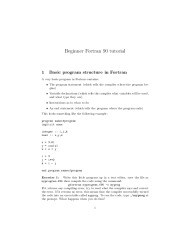Beginner Fortran 90 tutorial
Download Free course and training document about Fortran 90, tutorial on 20 pages for beginners by Guy Munhoven.
Table of contents
- Basic program structure in Fortran
- Exercise
- Outputting data
- Reading data
- Do loops
- Functions
- Arrays
- Subroutines
General structure of a Fortran 90 program
Fortran 90 distinguishes the following program units (scoping units):
- main program;
- subroutines: subroutines and functions;
- modules;
- block data.
At first, we will not deal with modules or block data. It should be noted that the modules are among the most useful innovations of Fortran 90.
Main program
The main program has the following structure:
[PROGRAM [program name]]
specification and declaration instructions
executable instructions
[CONTAINS internal procedures]
END [PROGRAM [program name]]
Everything enclosed in square brackets ([...]) is optional (the brackets themselves are to be omitted in all cases). The PROGRAM statement is not mandatory, but the END statement. The latter can be completed by the PROGRAM attribute which must then be followed by the name of the program
name of the program. Different types of content (specification instructions
and declaration, executable instructions, etc.) are described below.
Subroutines
The subroutine subroutines have a structure similar to that of the main program:
SUBROUTINE name of the subroutine [(arguments)]
specification and declaration instructions
executable instructions
[CONTAINS internal procedures]
END [SUBROUTINE name of the subroutine]
The END statement is mandatory, but not the SUBROUTINE additional specification. If it is given, which is recommended, especially in the case where several subroutines are gathered in the same file, it must be
completed by the name of the subroutine, exactly as specified on the SUBROUTIN line.
Subroutines are run using the CALL command name of the subroutine [(arguments)]
functions
Function type subroutines return a result by calling them by name:
[type] FUNCTION function name ([argument list])
specification and declaration instructions
executable instructions
[CONTAINS internal procedures]
END [FUNCTION function name]
The type (see below) can be specified (recommended); otherwise, it is determined by the default typing rules (see below).
| Size : | 134.745 Kb |
| File type : | |
| Downloads: | 169 |
| Created: | 2018-05-21 |

Warning: Trying to access array offset on false in /home/tutovnfz/public_html/article.php on line 233
Others Fortran Tutorials
Introduction to programming with Fortran 95
Others related eBooks about Beginner Fortran 90 tutorial
Network Programming with GoDive into key topics in network architecture and Go, such as data serialization, application level protocols, character sets and encodings. This book covers network architecture and gives an overview of the Go language as a primer, covering the latest Go release....
The Pascal Programming LanguageThis tutorial will give you great understanding on Pascal Programming concepts, Download free PDF training course on 13 pages by B.A.C. Schopman....
Deep Learning with JavaScriptDownload free course Deep Learning with JavaScript, pdf file on 560 pages by Shanqing Cai, Stanley Bileschi, Eric D. Nielsen, Francois Chollet....
Prolog tutorial in PDFDownload free Prolog tutorial course in PDF, training file in 17 chapters and 51 pages. Free unaffiliated ebook created from Stack OverFlow contributor....
Problem Solving with Algorithms and Data StructuresDownload free course Problem Solving with Algorithms and Data Structures, pdf file on 240 pages by Brad Miller, David Ranum....
Modeling and Simulation in PythonThis book is an introduction to physical modeling using a computational approach. It is organized in three parts:...
Introduction to C and GUI ProgrammingThe popular C programming language is used for a huge range of applications, from the tiny microcontrollers used in toasters and watches up to complete operating systems....
Language D tutorial in PDFDownload free Language D tutorial course in PDF, training file in 17 chapters and 44 pages. Free unaffiliated ebook created from Stack OverFlow contributor....
Practices of the Python ProProfessional developers know the many benefits of writing application code that's clean, well-organized, and easy to maintain. By learning and following established patterns and best practices, you can take your code and your career to a new level....
PC Assembly LanguageThe purpose of this book is to give the reader a better understanding of how computers really work at a lower level than in programming languages like Pascal. The tutorial has extensive coverage of interfacing assembly and C code and so might be of interest to C programmers who want to learn about...